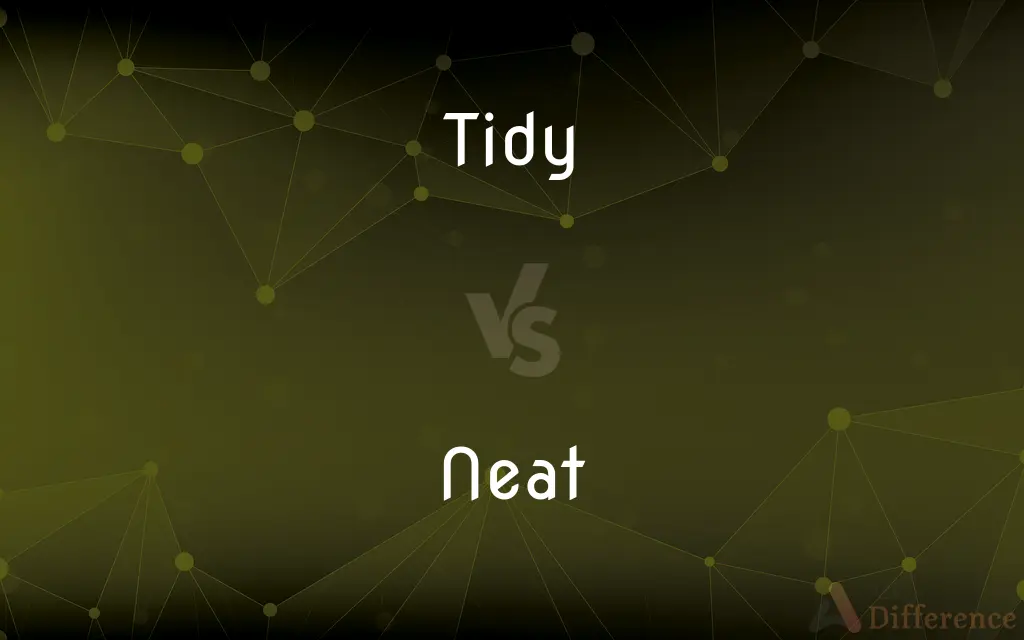Tidy vs. Neat — What's the Difference?
Edited by Tayyaba Rehman — By Urooj Arif — Updated on April 1, 2024
Tidy emphasizes organization and cleanliness, while neat focuses on orderliness and appearance without necessarily involving deep cleaning.

Difference Between Tidy and Neat
Table of Contents
ADVERTISEMENT
Key Differences
Tidy is often associated with the process of cleaning and organizing spaces, ensuring that everything is in its proper place and that the area is clean. It involves a comprehensive approach to both cleanliness and order. On the other hand, neatness emphasizes the appearance of order and precision. A neat space might not require thorough cleaning, but it is arranged in a way that looks appealing and orderly.
While tidying up a room might involve dusting, vacuuming, and putting items away, maintaining neatness could simply mean aligning books on a shelf or straightening items. Neatness is more about the visual appeal and immediate impression of order, whereas tidiness encompasses the practical aspects of cleanliness and organization.
Tidy spaces often give a sense of well-being because they are both clean and organized, reducing stress and making it easier to find items. Neat spaces, while they may also offer visual calm, do not necessarily guarantee that the space is clean or functional, but they are pleasant to look at.
Organizing a workspace can be considered tidying when it involves sorting through paperwork, cleaning off surfaces, and creating a system for items to be kept. Neatness in the same context would focus on how the desk is presented, such as aligning pens and papers, without extensive sorting or discarding of items.
The goal of tidying is to create a space that is both visually pleasing and functionally efficient, incorporating cleaning into the process. Neatness aims primarily at an orderly appearance, which can sometimes be achieved with minimal effort and does not always include a thorough clean-up.
ADVERTISEMENT
Comparison Chart
Focus
Organization and cleanliness
Orderliness and appearance
Cleaning Required
Yes, involves cleaning and organizing
Not necessarily, more about arrangement
Visual Appearance
Can vary; emphasizes cleanliness and organization
Primarily focused on being visually appealing
Functional Efficiency
High, as it involves organizing for ease of use
Can be low; mainly about visual order, not usage
Effort and Time
Usually requires more effort and time
Less effort and time, focused on surface-level tidiness
Compare with Definitions
Tidy
Conductive to cleanliness and order.
A tidy kitchen is essential for efficient cooking.
Neat
Efficient and well-organized.
The neat layout of the apartment made it feel spacious.
Tidy
Reflecting careful management.
She maintained a tidy schedule, allowing time for both work and relaxation.
Neat
Showing care in appearance.
Dressed in a neat suit, he was ready for the interview.
Tidy
Free from clutter or mess.
After a thorough cleaning, the room looked tidy and welcoming.
Neat
Arranged in a tidy manner.
His clothes were folded neatly in the drawer.
Tidy
Involving regular cleaning or maintenance.
He kept a tidy garden, free from weeds and debris.
Neat
Having a simple, pleasing appearance without clutter.
The neat handwriting on the card was impressive.
Tidy
Orderly and clean in appearance
Keeps the apartment tidy.
Neat
Free from what is unnecessary or unwanted.
His neat answer to the complex question was surprisingly concise.
Tidy
Given to keeping things clean and in order
A tidy housekeeper.
Neat
Arranged in a tidy way; in good order
The books had been stacked up in neat piles
Tidy
(Informal) Adequate; satisfactory
A tidy arrangement.
Neat
Done with or demonstrating skill or efficiency
A neat bit of deduction
Tidy
(Informal) Substantial; considerable
A tidy sum.
Neat
(of liquid, especially spirits) not diluted or mixed with anything else
He drank neat Scotch
Tidy
To clean or put in order
Tidied up the house.
Neat
Very good; excellent
It was really neat seeing the city
Tidy
To make things clean or orderly
Tidied up after dinner.
Neat
A bovine animal.
Tidy
A decorative protective covering for the arms or headrest of a chair.
Neat
Orderly and clean; tidy
A neat office.
A neat desk.
Tidy
Arranged neatly and in order.
Keep Britain tidy by picking up litter.
Neat
Habitually tidy or well-organized
Was lucky to have a neat roommate.
Tidy
Not messy; neat and controlled.
Neat
Marked by ingenuity and skill; adroit
A neat turn of phrase.
Tidy
(colloquial) Satisfactory; comfortable.
Neat
Not diluted or mixed with other substances
Neat whiskey.
Tidy
(colloquial) Generous, considerable.
The scheme made a tidy profit.
Neat
Left after all deductions; net
Neat profit.
Tidy
(obsolete) In good time; at the right time; timely; seasonable; opportune; favourable; fit; suitable.
Neat
(Slang) Wonderful; terrific
That was a neat party.
Tidy
(obsolete) Brave; smart; skillful; fine; good.
Neat
A cow or other domestic bovine animal.
Tidy
Appropriate or suitable as regards occasion, circumstances, arrangement, or order.
Neat
Clean, tidy; free from dirt or impurities.
My room is neat because I tidied it this morning.
She has very neat hair.
Tidy
To make tidy; to neaten.
There's a work room, with an orange-scaled kobold tidying up a series of massaging tables
Neat
Free from contaminants; unadulterated, undiluted. Particularly of liquor and cocktails; see usage below.
I like my whisky neat.
Tidy
A tabletop container for pens and stationery.
A desk tidy
Neat
(chemistry) Conditions with a liquid reagent or gas performed with no standard solvent or cosolvent.
The Arbuzov reaction is performed by adding the bromide to the phosphite, neat.
The molecular beam was neat acetylene.
Tidy
A cover, often of tatting, drawn work, or other ornamental work, for the back of a chair, the arms of a sofa, etc.
Neat
(archaic) With all deductions or allowances made; net.
Tidy
(dated) A child's pinafore.
Neat
Having a simple elegance or style; clean, trim, tidy, tasteful.
The front room was neat and carefully arranged for the guests.
Tidy
The wren.
Neat
Well-executed or delivered; clever, skillful, precise.
Having the two protagonists meet in the last act was a particularly neat touch.
Tidy
(Wales) Expression of agreement or positive acknowledgement, usually in reply to a question; great, fine.
Neat
Facile; missing complexity or details in the favor of convenience or simplicity.
Courts should not reduce this case to a neat set of legal rules.
Tidy
The wren; - called also tiddy.
The tidy for her notes as delicate as they.
Neat
Good, excellent, desirable.
Hey, neat convertible, man.
Tidy
A cover, often of tatting, drawn work, or other ornamental work, for the back of a chair, the arms of a sofa, or the like.
Neat
Used to signify a job well done.
Tidy
A child's pinafore.
Neat
Used to signify approval.
Tidy
Being in proper time; timely; seasonable; favorable; as, tidy weather.
If weather be fair and tidy.
Neat
(informal) An artificial intelligence researcher who believes that solutions should be elegant, clear and provably correct. Compare scruffy.
Tidy
Arranged in good order; orderly; appropriate; neat; kept in proper and becoming neatness, or habitually keeping things so; as, a tidy lass; their dress is tidy; the apartments are well furnished and tidy.
A tidy man, that tened [injured] me never.
Neat
(archaic) A bull or cow.
Tidy
To put in proper order; to make neat; as, to tidy a room; to tidy one's dress.
Neat
(archaic) Cattle collectively.
Tidy
To make things tidy.
I have tidied and tidied over and over again.
Neat
Cattle of the genus Bos, as distinguished from horses, sheep, and goats; an animal of the genus Bos; as, a neat's tongue; a neat's foot.
Wherein the herds[men] were keeping of their neat.
The steer, the heifer, and the calfAre all called neat.
A neat and a sheep of his own.
Tidy
Receptacle that holds odds and ends (as sewing materials)
Neat
Of or pertaining to the genus Bos, or to cattle of that genus; as, neat cattle.
Tidy
Put (things or places) in order;
Tidy up your room!
Neat
Free from that which soils, defiles, or disorders; clean; cleanly; tidy.
If you were to see her, you would wonder what poor body it was that was so surprisingly neat and clean.
Tidy
Marked by good order and cleanliness in appearance or habits;
A tidy person
A tidy house
A tidy mind
Neat
Free from what is unbecoming, inappropriate, or tawdry; simple and becoming; pleasing with simplicity; tasteful; chaste; as, a neat style; a neat dress.
Tidy
(used of hair) neat and tidy;
A nicely kempt beard
Neat
Free from admixture or adulteration; good of its kind; as, neat brandy; to drink one's vodka neat.
Tidy
Large in amount or extent or degree;
It cost a considerable amount
A goodly amount
Received a hefty bonus
A respectable sum
A tidy sum of money
A sizable fortune
Neat
Excellent in character, skill, or performance, etc.; nice; finished; adroit; as, a neat design; a neat thief.
Neat
Clean or orderly;
Her neat dress
A neat room
Neat
Showing care in execution;
Neat homework
Neat handwriting
Neat
Free from what is tawdry or unbecoming;
A neat style
A neat set of rules
She hated to have her neat plans upset
Neat
Free from clumsiness; precisely or deftly executed;
He landed a clean left on his opponent's cheek
A clean throw
The neat exactness of the surgeon's knife
Neat
Very good;
He did a bully job
A neat sports car
Had a great time at the party
You look simply smashing
Neat
Without water;
Took his whiskey neat
Common Curiosities
What makes a space tidy?
A space is considered tidy when it is clean, clutter-free, and everything is organized systematically.
Is tidying more time-consuming than neatening?
Generally, yes, because tidying involves cleaning and organizing, while neatening mainly focuses on arranging items to look orderly.
Can neatness affect productivity?
Yes, a neat workspace can reduce distractions and improve focus, potentially increasing productivity.
Can a room be neat but not tidy?
Yes, a room can appear neat with items arranged orderly but may not be tidy if it's not cleaned thoroughly.
Do tidying and neatening require different skills?
Somewhat; tidying requires a knack for cleaning and organization, whereas neatening is more about arranging items aesthetically.
Is it easier to maintain a tidy or a neat space?
Maintaining a neat space is often easier since it doesn’t always require the regular cleaning that tidiness does.
How can I quickly make a room neat?
Aligning objects, straightening pillows, and hiding clutter can quickly improve a room’s neatness.
Can digital spaces be tidy and neat?
Yes, digital spaces like desktops and folders can be organized and arranged for cleanliness and order.
Is it harder to keep shared spaces tidy or neat?
Shared spaces can be challenging to keep both tidy and neat due to differing habits and standards of cleanliness.
What are the benefits of a tidy environment?
A tidy environment can reduce stress, increase efficiency, and make finding items easier.
How often should I tidy to keep my space neat?
Regular tidying is essential for maintaining neatness, though the frequency depends on your daily habits and space usage.
Does neatness contribute to a minimalist lifestyle?
Yes, neatness, with its emphasis on simplicity and order, aligns well with minimalist principles.
Do children benefit from tidy or neat spaces more?
Children benefit from both, as tidy spaces support hygiene and neat spaces can foster organizational habits.
How does one balance tidiness and neatness in a busy life?
Balancing tidiness and neatness involves setting routines, prioritizing tasks, and possibly lowering perfectionist standards.
Can hiring a professional help achieve tidiness and neatness?
Yes, professionals can offer expertise and consistent effort in maintaining both tidiness and neatness in a space.
Share Your Discovery

Previous Comparison
Accident vs. Emergency
Next Comparison
Thumbnail vs. ThumbtackAuthor Spotlight
Written by
Urooj ArifUrooj is a skilled content writer at Ask Difference, known for her exceptional ability to simplify complex topics into engaging and informative content. With a passion for research and a flair for clear, concise writing, she consistently delivers articles that resonate with our diverse audience.
Edited by
Tayyaba RehmanTayyaba Rehman is a distinguished writer, currently serving as a primary contributor to askdifference.com. As a researcher in semantics and etymology, Tayyaba's passion for the complexity of languages and their distinctions has found a perfect home on the platform. Tayyaba delves into the intricacies of language, distinguishing between commonly confused words and phrases, thereby providing clarity for readers worldwide.














































